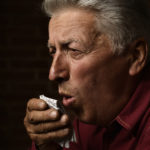By David Blyweiss, M.D.
It’s flu season again, and many of my patients are asking me if they need to get a flu shot. But, in spite of the fact that the U.S. Center for Disease Control and Prevention advocates a seasonal flu shot for everyone, unless you have a severely weakened immune system, I believe there are natural ways to protect yourself from getting the flu.
When your immune system is working properly, it has a remarkable ability to fight off the flu. Even if an infection does gain a foothold, it’s usually just a matter of time before the immune system mounts an effective counterattack.
Whether you decide to get a flu shot or not, it’s important to bolster your immunity, especially during the fall and winter months. Here are a few ways to boost your immune system:
- Be sure to eat a well-balanced diet filled with fresh fruits and vegetables.
- Avoid refined sugars and saturated fats, but make sure you get plenty of high-quality protein and essential fatty acids. A good source of protein is fish or poultry and essential fatty acids can also be found in fish, flaxseed, pumpkin seeds, and leafy vegetables.
- Take a high-quality multivitamin/mineral supplement.
- Make sure you get enough sleep. Lack of sleep compromises the immune system and makes you vulnerable to attack by viruses and bacteria. You should try to get at least 7-9 hours every night.
- Since stress affects the immune system, try practicing relaxation techniques like deep breathing, yoga, or meditation.1
While I’ve found that these simple steps can go a long way toward keeping you healthy, there are two supplements that are absolutely critical during flu season. The first is vitamin D.
It’s no secret that low levels of vitamin D are linked to at least 17 types of cancer. As well as heart disease, stroke, high blood pressure, autoimmune diseases, diabetes, depression, and many more common health conditions. But its role in flu prevention hasn’t been explored—until now. Recently, scientists have discovered that people with vitamin D levels lower than 38 ng/ml had twice as many upper respiratory tract infections as those with higher levels.
They’ve also found that kids who took 1,200 IU of vitamin D daily reduced their risk of developing the flu by 58%. And women taking 2,000 IU of vitamin D to protect their bones had an average of 30% fewer bouts with colds and flu than women taking the standard recommendation of 200 IU.2
Because one out of every two Americans is likely to have low levels of this crucial nutrient, supplementing with 2,000 to 5,000 IU of vitamin D each day might be more effective than getting a flu shot.
Mother Nature can also provide some potent protection during flu season. Elderberry is my No. 1 pick to protect against the flu. In a double-blind, placebo-controlled study of elderberry against 10 strains of the flu, researchers at Hadassah University Hospital in Jerusalem, Israel, found that the herb stopped the flu dead in its tracks by significantly boosting immune response and blocking viral growth.3 This makes elderberry effective against a wide range of influenza viruses.
The World's Quickest Solution for Ending Prostate and Urinary Misery
This has recently been revealed to be one of the only real breakthroughs in prostate health.
The seeds of a strange fruit (sometimes called "Chinese Apples") hold powerful phytonutrients that are a revolution in prostate health.
In fact, UCLA and Veterans Administration research have now proved this to be true.
Not only that, but it may be the worlds quickest solution for ending prostate misery.
Simply stated, these phytonutrients represent a huge step beyond beta sitosterol, saw palmetto, and other phytosterols alone.
Simply click HERE if you want to have fast prostate relief...restful, uninterrupted sleep...no more constant "urges to go"...enhanced virility...and optimal prostate support for life.
Elderberry syrup is also incredibly effective if you do come down with the flu. Studies show that elderberry helps flush the virus out of the body by inducing both perspiration and bronchial secretions. And a recent randomized, double-blind, placebo-controlled study of 60 flu patients by the University of Oslo and the National Health Institute in Oslo, Norway, found that people taking elderberry extract got relief from their symptoms four days earlier than their placebo-pumping counterparts.
These all-natural measures can give you safe and effective protection against the flu this winter. Best of all, none require a single injection!
References:
1. Pedersen AF. Psychological stress and antibody response to influenza vaccination: a meta-analysis. Brain, Behavior, and Immunity. 2009;23:427-433.
2. Schwalfenberg GK. A review of the critical role of vitamin D in the functioning of the immune system and the clinical implications of vitamin D deficiency. Molecular Nutrition & Food Research. 2010 Sep 7. [Epub ahead of print]
3. Barak V. The effect of Sambucol, a black elderberry-based, natural product, on the production of human cytokines: I. Inflammatory cytokines. European Cytokine Network. 2001;12:290-296. A






